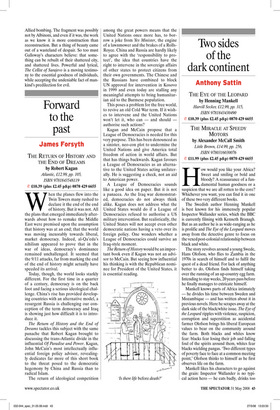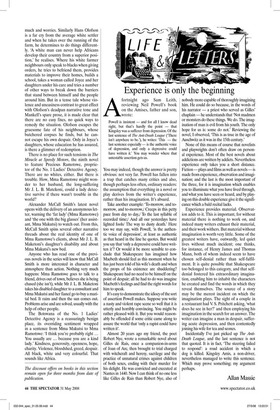Two sides of the dark continent
Anthony Sattin
THE EYE OF THE LEOPARD by Henning Mankell Harvill Secker, £12.99, pp. 315, ISBN 9781843430490 ✆ £10.39 (plus £2.45 p&p) 0870 429 6655 THE MIRACLE AT SPEEDY MOTORS by Alexander McCall Smith Little Brown, £14.99, pp. 256, ISBN 9780316030076 ✆ £11.99 (plus £2.45 p&p) 0870 429 6655 How would you like your Africa? Sweet and smiling or bold and bloody? A reassurance of a fundamental human goodness or a suspicion that we are all rotten to the core? Whichever you want, you can find it in one of these two very different books.
The Swedish author Henning Mankell is best known for his immensely popular Inspector Wallander series, which the BBC is currently filming with Kenneth Branagh. But as an author he is as wide-ranging as he is prolific and The Eye of the Leopard moves away from the detective genre to focus on the vexed post-colonial relationship between black and white.
The story revolves around a young Swede, Hans Olofson, who flies to Zambia in the 1970s in search of himself and to fulfil the quest of a dead friend. For lack of anything better to do, Olofson finds himself taking over the running of an up-country egg farm. Intending to stay weeks, 20 years pass before he finally manages to extricate himself.
Mankell knows parts of Africa intimately — he divides his time between Sweden and Mozambique — and has written about it in previous novels. Here he scrapes away at the dark side of the black/white issue. The Eye of the Leopard ripples with violence, suspicion, corruption and superstition as accidental farmer Olofson brings his liberal European values to bear on the community around the farm. Both blacks and whites know fear: blacks fear losing their job and falling foul of the spirits around them, whites fear blacks wielding pangas. ‘Two different types of poverty face to face at a common meeting point,’ Olofson thinks to himself as he first observes life on the farm.
Mankell likes his characters to go against the grain: Inspector Wallander is no typical action hero — he eats badly, drinks too much and worries. Similarly Hans Olofson is a far cry from the average white settler and when he takes over the running of the farm, he determines to do things differently. ‘A white man can never help Africans develop their country from a superior position,’ he realises. Where his white farmer neighbours only speak to blacks when giving orders, he tries to befriend them, provides materials to improve their homes, builds a school, takes a woman called Joyce and her daughters under his care and tries a number of other ways to break down the barriers that stand between himself and the people around him. But in a tense tale whose violence and uneasiness contrast to great effect with Olofson’s deadpan narrative tone and Mankell’s spare prose, it is made clear that there are no easy fixes, no quick ways to remedy the situation. Olofson escapes the gruesome fate of his neighbours, whose butchered corpses he finds, but he cannot escape his own despair. Only in Joyce’s daughters, whose education he has assured, is there a glimmer of redemption.
There is no place for such tensions in The Miracle at Speedy Motors, the ninth novel to feature Precious Ramotswe, proprietor of the No. 1 Ladies’ Detective Agency. There are no whites, either. But there is trouble. How, Mma Ramotswe might wonder to her husband, the long-suffering Mr J. L. B. Matekoni, could a lady detective survive if there wasn’t trouble in the world?
Alexander McCall Smith’s latest novel opens with the delivery of an anonymous letter, warning the ‘fat lady’ (Mma Ramotswe) and ‘the one with the big glasses’ (her assistant, Mma Makutsi) to watch out. From this, McCall Smith spins several other narrative threads about the real identity of one of Mma Ramotswe’s clients, about Mr J. L. B. Maketoni’s daughter’s disability and about Mma Makutsi’s new bed.
Anyone who has read one of the previous novels in the series will know that McCall Smith is more interested in character and atmosphere than action. Nothing very much happens: Mma Ramotswe goes to talk to a friend, drives out of town, believes she is being chased (she isn’t), while Mr J. L. B. Maketoni takes his disabled daughter to a consultant and Mma Makutsi and her fiancé go to buy a marital bed. It rains and then the sun comes out. Problems arise and are solved, usually with the help of other people.
The Botswana of the No. 1 Ladies’ Detective Agency is a reassuringly benign place, its overriding sentiment wrapped in a sentence from Mma Makutsi to Mma Ramotswe: ‘I think you’re probably right ... You usually are ... because you are a kind lady.’ Kindness, generosity, openness, hope, charity. Violence, bloodshed, greed, despair. All black, white and very colourful. That sounds like Africa.











































































 Previous page
Previous page